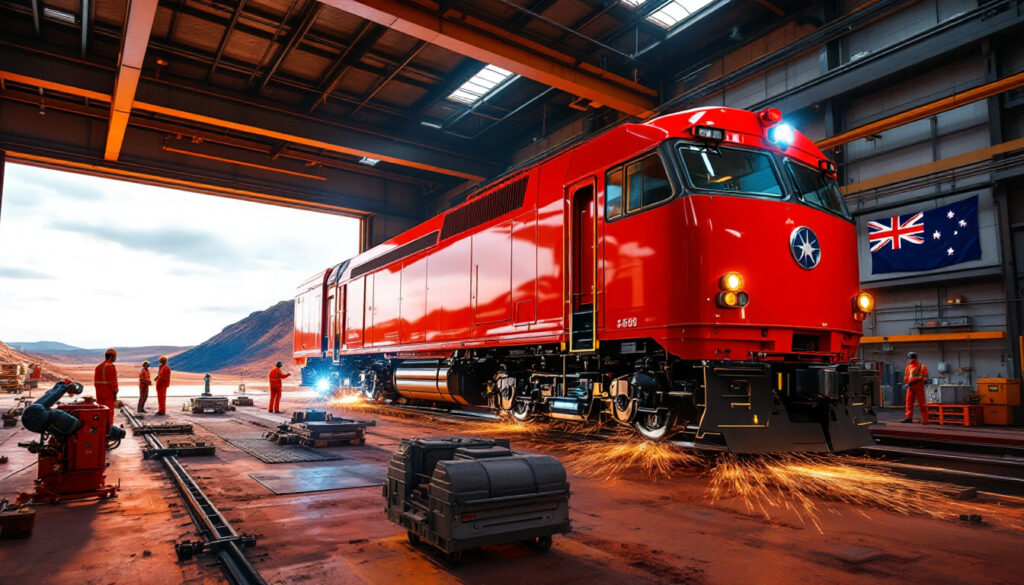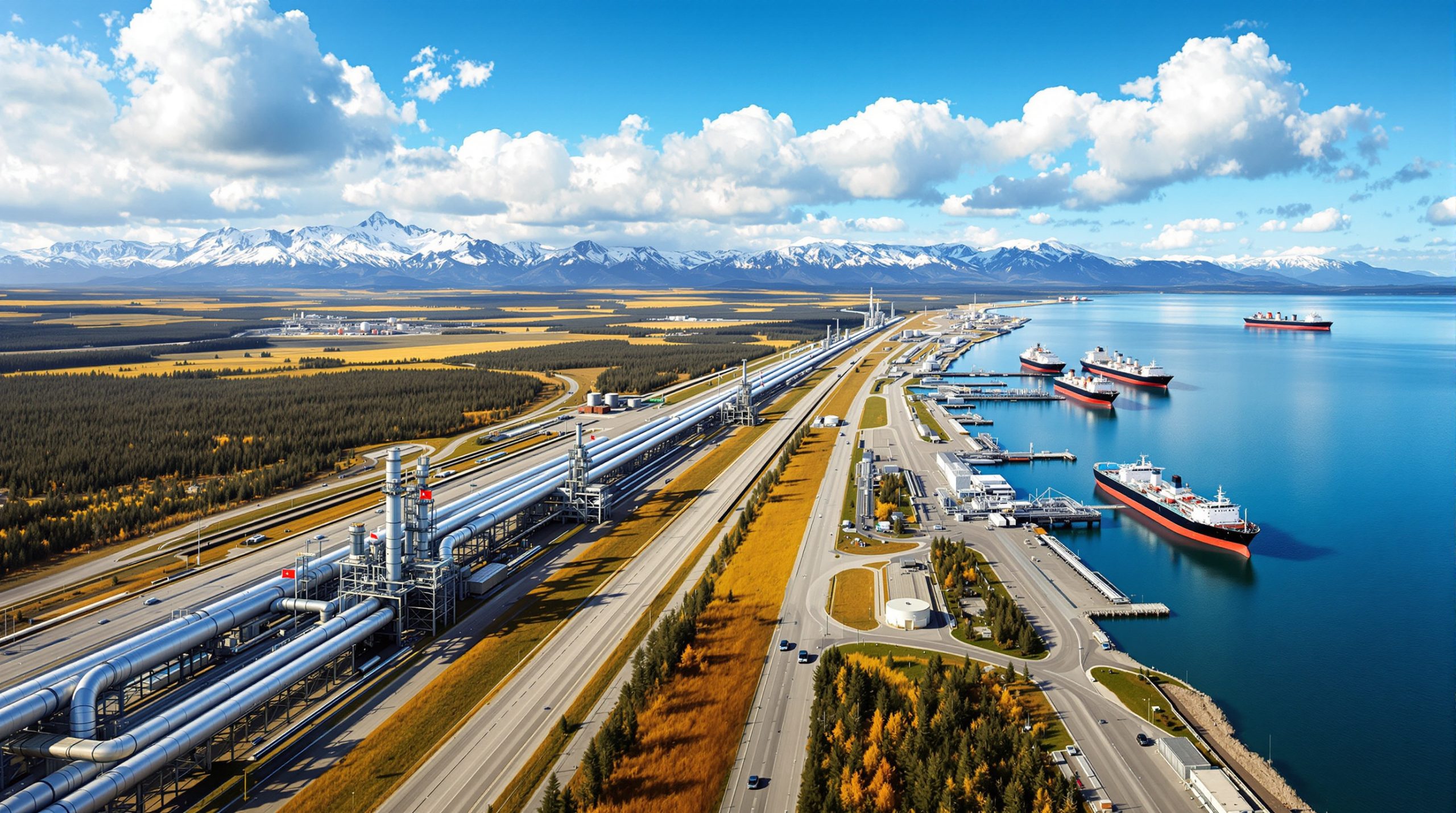Rio Tinto's First WA-Built Iron Ore Rail Car: A Manufacturing Milestone
In a significant development for Western Australia's manufacturing industry, Rio Tinto has unveiled its first locally-built iron ore rail car. This milestone marks the beginning of a new era in the state's industrial capabilities and represents a crucial step towards establishing a more resilient supply chain for Australia's vital mining sector.
The new rail car, capable of carrying up to 118 tonnes of iron ore, is the first of 100 units planned for production in Western Australia. The initiative forms part of Rio Tinto's $150 million investment strategy aimed at strengthening domestic manufacturing capabilities and reducing dependence on international suppliers.
What is the significance of Rio Tinto's new rail car?
The introduction of Western Australian-built rail cars represents more than just a manufacturing achievement—it signals a strategic shift towards local production of critical mining infrastructure. Until now, Rio Tinto has primarily relied on international suppliers for its rail car fleet, which services its extensive Rio Tinto's iron ore operations and shipment performance.
This development comes at a time when global supply chains have faced unprecedented challenges, highlighting the importance of domestic manufacturing capabilities for essential industrial equipment. The rail cars are critical components in Rio Tinto's iron ore operations, connecting its 17 Pilbara mines to port facilities through one of the world's largest private rail networks.
Key Features of the New Rail Car
The newly manufactured rail car incorporates several advanced engineering elements that make it particularly well-suited to the demands of iron ore transportation in Western Australia's harsh environmental conditions:
- Capacity to carry up to 118 tonnes of iron ore per journey
- Purpose-built design for the Pilbara's unique operating environment
- Advanced engineering specifications to ensure longevity in extreme conditions
- State-of-the-art robotic welding technologies employed in manufacturing
- Enhanced durability features to withstand the rigors of heavy mineral transport
- Produced through strategic partnership between Gemco Rail and CRRC Qiqihar Rolling Stock
Industry experts note that the rail cars have been designed with Western Australia's specific operational requirements in mind, including adaptability to the region's extreme temperature fluctuations and heavy-duty usage patterns.
How is this initiative strengthening local manufacturing?
The rail car manufacturing program represents a significant boost to Western Australia's industrial capabilities, creating a specialized production capacity that has been absent from the state for decades. This initiative aligns perfectly with broader economic diversification goals while establishing sustainable local supply chains.
Partnership Details and Manufacturing Plan
The manufacturing initiative involves a carefully structured approach to building local capacity:
- Initial production of 40 rail cars at Gemco's Forrestfield facility in Perth
- Planned expansion to Karratha in the Pilbara region by 2025
- Production of an additional 60 rail cars at the Karratha facility
- Creation of a dedicated manufacturing and bearing maintenance industry in the Pilbara
- Support for up to 25 new regional jobs in Western Australia
- Development of specialized technical skills within the local workforce
The manufacturing process incorporates cutting-edge robotic welding and advanced quality control systems, bringing world-class manufacturing techniques to Western Australia's industrial sector. This technological transfer is expected to enhance the region's broader manufacturing capabilities.
Economic Impact and Government Support
The Western Australian Government has strongly backed this initiative as part of its economic diversification strategy. WA Premier Roger Cook has explicitly highlighted the project as aligning with state objectives to strengthen and diversify the economy.
"Diversifying our economy and making more things here are key to our plan to maintain Western Australia as the strongest economy in the nation. That's why we are so pleased to see Gemco rolling out its first locally built iron ore railcar wagon," stated Premier Cook.
The initiative is expected to generate significant economic benefits beyond direct employment, including:
- Creation of supporting supply chain opportunities for local businesses
- Enhancement of technical capabilities in regional areas
- Reduced economic leakage from importing manufactured goods
- Establishment of a sustainable manufacturing ecosystem in the Pilbara
Why is local rail car production important for Australia's mining sector?
The establishment of local rail car manufacturing addresses several critical vulnerabilities in Australia's mining infrastructure supply chain. Iron ore remains Australia's largest export commodity, generating approximately $120 billion annually, with Rio Tinto being one of the nation's largest producers.
Supply Chain Resilience Benefits
Mining industry analysts point to several key advantages that local production provides:
- Reduced dependence on international suppliers for critical equipment
- Shortened lead times for replacement and additional rail cars
- Minimized exposure to global shipping disruptions and delays
- Enhanced ability to quickly respond to changing operational requirements
- Greater control over quality assurance processes
- Development of local expertise in specialized mining equipment manufacturing
The COVID-19 pandemic exposed significant vulnerabilities in global supply chains, with many mining operations facing challenges in securing necessary equipment and components. This local manufacturing initiative directly addresses these vulnerabilities, providing greater certainty for Australia's 2024 mining sector economic outlook.
Industry Collaboration and Innovation
The project represents a significant collaboration between key industry players:
- Engenco Limited (Gemco Rail's parent company) is investing in facility expansion
- CRRC Qiqihar Rolling Stock is providing technical expertise and knowledge transfer
- Rio Tinto is committing to long-term procurement from local suppliers
- Western Australian Government is supporting through favorable policy settings
Dean Draper, Managing Director and CEO of Engenco, emphasized the historical significance of the partnership: "We are proud to partner with Rio Tinto to re-establish iron ore rail car manufacturing in Western Australia. The construction of Rio Tinto's first locally built rail car marks a significant milestone in developing a sustainable local supply chain."
The collaboration extends beyond just manufacturing to include innovation in design and maintenance processes. The Karratha facility will eventually handle bearing maintenance and reconditioning, establishing comprehensive manufacturing and maintenance capabilities within the region.
What do industry leaders say about this development?
Key stakeholders from both industry and government have expressed strong support for the initiative, highlighting its multifaceted benefits.
Expert Perspectives
Simon Trott, Rio Tinto Iron Ore Chief Executive, emphasized the broader community impact: "We want to support local business and create new economic opportunities in the communities where we operate. By partnering with Gemco Rail and CRRC Qiqihar Rolling Stock, we are establishing new manufacturing capability in the Pilbara that will create a reliable and sustainable supply chain to support our operations and the regional economy for years to come."
Mining industry analysts note that this initiative may represent the beginning of a broader trend toward reshoring critical manufacturing capabilities for the resources sector. The approach could potentially be replicated for other types of mining equipment, further strengthening Australia's industrial self-sufficiency.
Resource sector economists point out that the investment makes strategic sense beyond just supply chain security. Local manufacturing reduces currency exchange risks, shipping costs, and carbon emissions associated with international procurement—factors increasingly important in ESG challenges and global opportunities in mining.
The Environmental and Technological Dimension
The locally manufactured rail cars incorporate several design improvements that contribute to environmental sustainability. Engineering specifications have been optimized to reduce weight while maintaining strength, improving fuel efficiency in transport operations.
Additionally, the manufacturing process in Western Australia utilizes advanced energy management systems and robotics that significantly reduce waste and energy consumption compared to traditional manufacturing methods. This aligns with Rio Tinto's broader commitment to decarbonisation in mining driving clean energy initiatives across all operations.
Industry experts point out that the technological knowledge transfer associated with the project will have spillover benefits for Western Australia's broader manufacturing sector, potentially catalyzing innovation in adjacent industries.
FAQ About Rio Tinto's Iron Ore Rail Car Initiative
How many rail cars will be manufactured in Western Australia?
Rio Tinto has committed to manufacturing 100 rail cars in Western Australia, with 40 being built at Gemco's Forrestfield facility in Perth and 60 more to be produced in Karratha.
What is the capacity of the new rail cars?
Each rail car is capable of carrying up to 118 tonnes of iron ore from Rio Tinto's 17 Pilbara mines to its ports.
How does this initiative support the local economy?
The manufacturing initiative will create up to 25 regional jobs in the Pilbara and establish a new manufacturing and bearing maintenance industry in the region, contributing to economic diversification in Western Australia.
What technologies are being used in the manufacturing process?
Gemco Rail is utilizing advanced engineering and robotic welding technologies to produce the rail cars, bringing cutting-edge manufacturing capabilities to Western Australia.
How does local manufacturing improve supply chain resilience?
By producing rail cars locally, Rio Tinto reduces dependence on international suppliers, minimizes exposure to global shipping disruptions, and gains greater control over quality assurance processes.
What is the timeline for the expansion to Karratha?
The manufacturing operation is scheduled to expand to Karratha in the Pilbara region by 2025, where an additional 60 rail cars will be produced.
The Future of Mining Equipment Manufacturing in Australia
This initiative may well represent just the beginning of a broader reshoring trend in Australia's mining sector. Industry analysts suggest that success with rail car manufacturing could lead to expanded local production of other critical mining equipment, potentially including haul trucks, conveyor systems, and processing equipment.
The economic multiplier effects of such manufacturing growth could be substantial, creating opportunities for component suppliers, maintenance services, and specialized logistics providers throughout Western Australia.
As the global mining industry increasingly focuses on supply chain resilience and government-backed innovation in critical minerals, initiatives like Rio Tinto's local rail car manufacturing program are likely to become more common, representing a significant shift in how mining companies approach their equipment procurement strategies.
Ready to Capitalise on the Next Major Mineral Discovery?
Stay ahead of the market with Discovery Alert's proprietary Discovery IQ model, delivering instant notifications on significant ASX mineral discoveries and transforming complex data into actionable insights. Understand why historic discoveries can generate substantial returns by visiting Discovery Alert's dedicated discoveries page and begin your 30-day free trial today.




